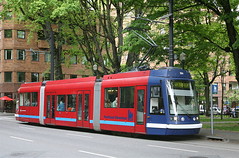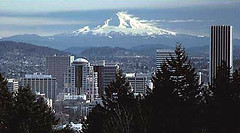How smart is your city?

Posted May 13, 2008 at 9:30PM
After so many wonky posts in a row, this time I'm going to lighten up with one of those fun internet quizzes that I can do more or less all day when I have something I want to procrastinate. This one is "How Smart Is Your City?" offering just a few breezy (but not entirely impertinent) questions. It's part of a special series about sustainable and green cities this week on Grist, and it will have articles on cities in the southwest, Atlanta and the southeast, cities in the Rust Belt, and the ever-popular "how to green your city!" conclusion. I make fun, but I'm really glad they are covering these issues.
In fact, if you live in a larger US metro area, chances are your city is ranked on a sustainablity scale published with the first article. My home, Washington DC, comes in 12th (out of 50). Portland, Oregon is ranked first.
 Of course, some bozo has already posted on Grist that Portland doesn't deserve its green hype. He couldn't be more wrong. Portland isn't perfect, but through excellent coordination of walkable development and public transportation, the greater Portland region decreased its per capita rate of driving by six percent from 1996-2006, a period in which other regions across the US increased theirs by an average ten percent. I think Portland may have been the only major US region to reduce driving rates over that period.
Of course, some bozo has already posted on Grist that Portland doesn't deserve its green hype. He couldn't be more wrong. Portland isn't perfect, but through excellent coordination of walkable development and public transportation, the greater Portland region decreased its per capita rate of driving by six percent from 1996-2006, a period in which other regions across the US increased theirs by an average ten percent. I think Portland may have been the only major US region to reduce driving rates over that period.
Here's what the American Planning Association said in giving its 2008 Planning Excellence Award to Metro, Portland's regional government:
"Helping reduce sprawl and carbon emissions in the 25-city, three-county Portland, Oregon, metropolitan region with 1.4 million residents by developing "up not out" is Metro, the area's unique governmental agency. Through nearly two dozen transit-oriented development projects completed during the past decade — and another dozen in the pipeline — Metro is showing how development can be more compact while at the same time reducing residents' dependence on automobiles for local trips and commuting to work.
"Projects completed to date have used 80 acres of land compared with 587 acres that would have been needed using conventional development practices."
Well-earned, in my opinion. And probably worth a blog post of its own at some point.
Thanks to NRDC's Kim Ranney for pointing me to the Grist series.

